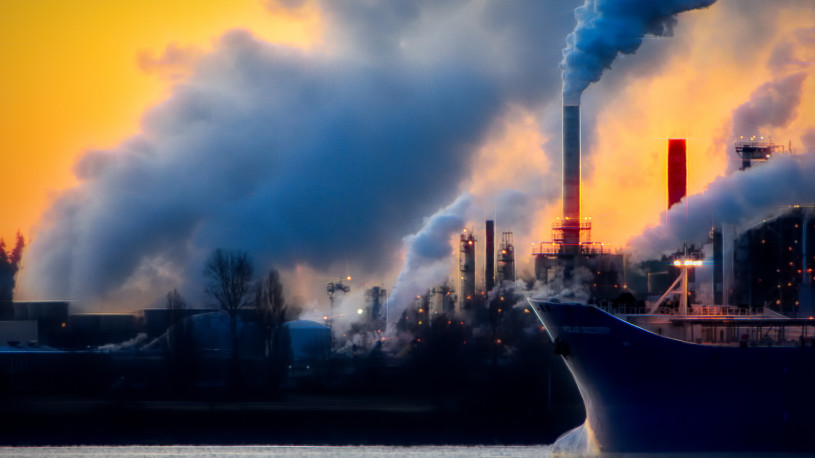-
How Can the Chemicals Industry Save the World?
 Continue Reading
Continue ReadingIt doesn’t seem like a big problem now. In fact, it didn’t seem like a big problem then, but way back in the 1980s, Richard Wilkey was looking for a new type of coating. One that would extend the life of the lawnmower blades of his Wisconsin based firm, Fisher Barton.
To do this he teamed up with Frank Worzala, then a professor of metallurgical and mineral engineering, and Worzala’s master’s student, Bill Lenling. Together they developed a process called Thermal Spray coating in which particles of a material are sprayed onto a surface at such a high velocity that the particles essentially melt and spread evenly across the surface.
This new coating dramatically improved the wear, oxidation and corrosion resistance; electrical conduction/insulation and biocompatibility of products in such industries as aerospace, electronics, food processing, biomedical and energy. In fact the project was so successful that it is now managed as Thermal Spray Technologies, with Lenling as its president.
This may not seem like a major scientific breakthrough or a great help to society, even if the processing plant does provide jobs for 145 people. But what it does show is the importance of an idea and the commitment to back it up with time and money.
Today, the world has greater worries than the durability of lawnmower blades. With a population expected to reach 12.6 billion people by the end of the century, the planet is short of resources, and when it comes to precious metals, the world is desperate for them all. That is what makes them so precious.
The platinum problem.
Just a few hundred tonnes of platinum are mined each year from naturally occurring sources, the rest is produced from a dirty by-product of nickel and copper processing, mostly from Africa.
It has good resistance to corrosion even at high temperatures, yet allows the transmission of an electric current, so it is often used in products such as pacemakers, solar cells and electrodes, as well as drugs, oxygen sensors and spark plugs.
As a valuable catalyst, around half of the world’s annual platinum production is used to control vehicle emissions in catalytic converters.
Demand for platinum is so high, that during the economic meltdown in 2008, its value rose to nearly US$70. Current values are a more reasonable US$41 per gram, but still high enough to be a burden to us all.
The platinum solution.
Researchers at the University of Alabama have developed a new electrode material called NanoCOT, which they claim has many of the same electrical properties as platinum, and yet costs half the price to make from a much cleaner process.
The secret to NanoCOT’s low price is that it is made up plentiful elements of carbon, oxygen and titanium, while the new material’s nanostructure allows for customisation and increased surface area.
Whilst this new product is still trying to find its feet in a commercial world, it does show the near-limitless possibilities that chemical engineering can provide.
You can’t afford gold plated bath taps today, but your children may have NanoCOT platinum plated ones tomorrow.
Sustainability and Progress.
This is a perfect example of chemical engineers responding to the challenges of resource depletion. Thirty years ago, a small piece of research helped to solve problems in getting the grass cut. In 2015, in Alabama they may have found a replacement for platinum. What links these two developments is the desire for progress and sustainability.
The world is able to have both, but only by embracing a new way of thinking. The commercial world is too often short-sighted, wanting a quick return on investment, despite the fact that the profit on well demonstrated products and process technologies based on good science are outstanding. The commercial world needs to wake up to what the chemical industry has to offer, how it can generate wealth and at the same time save the world.
So how can the chemical industry save the world? – Research.
-
The Chemical Industry – Development and Expectations in 2015
 Continue Reading
Continue ReadingOver recent years there has been steady growth in the chemical industry. This is particularly true in the United States, where industrial production grew by 3.2% during the third quarter of 2014. This is in comparison to developments in the EU, where the recovery process after the trauma of 2008 has been slow. Meanwhile, the prospects of emerging Asian economies in this sector remain unclear.
The production growth in the United States will largely be supported by two key sectors, the automotive and construction industries. Car sales continued to improve last year (up a further 1.4% in 2014), together with household consumption, whilst the construction sector also showed an increase in both prices and the volume of construction, although they have yet to surpass pre-crisis levels. Thus the U.S. represents a suitable region for investment, as it matches home market growth with price competitiveness in production costs.
These American trends have been matched worldwide by growth in the transport sector, a key area for the chemicals industry. This is in part due to the large amount of restructuring that has been undertaken over the last few years. This has contributed significantly to the recovery in demand for freight transport, which in turn has aided trade.
Only in Europe has the transportation industry suffered, this is as a result of the Russian embargo and strong competition between low-cost airlines, driving prices down.
Generally, however, higher global growth and an expected increase in trade should positively impact even the slowest economies over time, making a bright outlook for the chemicals industry in 2015.
-
FAQs
 Continue Reading
Continue ReadingHow do I know what price to offer goods or what price to demand for goods?
When choosing your initial Offer, we recommend putting a price slightly lower than you normally trade in, with shorter maturities, as this offer can gradually be increased. Potential partners can also take advantage of this system, by counter-offering prices and conditions that are more favourable to them. Offers are exchanged until a price and terms of trade are agreed.
If you make a Demand to buy goods, and then change your mind, you can cancel the deal within the cancellation period.
I do not want my competitors to know how much I am offering for goods. Can I Offer/Demand anonymously?
Yes. Use the “Hide the name of my company” option.
I do not want to buy goods “blindly”. Can I see a sample first?
Yes, when entering your Demand select “Request sample”.
I do not have time every day to check what is newly on offer. What can I do?
You can select a subgroup of products in the “My Portfolio” tab to make searching for new potential deals easier. You can also choose to have emails sent to you when new Offers and Demands are made for your favourite products.
How can I Offer or Demand goods which are not in the catalogue?
You can select “Apply for new product introduction.” to have it added to the catalogue. You can find this button at the foot of the search results page. You will be notified by email when the new product has been added. In the case of a more complex requirement, please contact the Call Centre.
What can I do if I want the goods that have been offered, but I do not agree with the price, delivery terms or other conditions?
You can request that the price or conditions be changed by making a counter-offer via the ‘Create Counter Offer’ button.
How will people hear about my Offer or Demand? How many people will hear about it?
The number of firms that will hear about your Offer or Demand depends on the type of goods, but at least several hundred companies will be notified by email. Many more will see your Offer or Demand on our portal. You can see exactly how many firms were contacted in a review of your Offer or Demand which is automatically generated when making the bid.
How do I know if anyone is interested in my goods?
You will be sent an email every time someone reacts to your Offer or Demand.
Nobody responded to my Offer / Demand. What did I do wrong?
Maybe the price or conditions were not appropriate. Try changing the parameters or just repeat your Offer or Demand and simply wait for a trade partner to respond.
Can I use the portal to enter into a one-time deal without registration?
No. We pride ourselves on having clients that have been rated as creditworthy by independent assessors and have established chemical trading histories. Therefore only those who registered can use the portal.
What guarantee do I have that I will receive the goods I ordered?
By using a system of registered users you can be confident that all trades made will be completed to the satisfaction of all parties. In the unlikely event of a disagreement, then the Spotchemi team will attempt to ensure that business is transacted according to contract. The execution and closing of the trade will however rest on standard business rules between the inquirer and the bidder. Both sides must ultimately resolve any discrepancies according to conventional processes. The purpose of this portal is to connect potential partners.
Some Offers or Demands from overseas companies are interesting, but we don’t have any experience in transporting goods over such a large distance. What can we do?
Firstly you can use change the conditions of the trade to allow for long distance transportation and use your newly found partner’s experience in importing/exporting to their country.
You can also use the logistics service offered by our sister company AG Chem Group Ltd, which you can find on the ‘logistics’ tab. If you have any further questions, please contact the Spotchemi call centre.
Why am I charged for increasing the value of the goods I am offering?
Spotchemi does not charge any commission for ongoing or closed transactions however some fees are necessary to keep the portal operating, verifying users, updating the catalogue, maintaining the call centre etc.
Where can I make a claim if I am not satisfied with the goods or service provided?
Specific terms of trade are agreed upon by both Parties at the conclusion of the deal. If you if believe the goods or services provided are sub-standard then you must contact the supplier of those goods or services. The Spotchemi call centre can assist you with this communication.
What are my rights and responsibilities as a portal user?
Registration to the Spotchemi portal is voluntary and allows registrants to trade in chemical products online, 24 hours a day with any device that is connected to the Internet, anywhere in the world. All these firms must abide by the standard terms and rules laid out at registration. Spotchemi reserves the rights to suspend or cancel the registration at any time, preventing further use of the portal.
Your Spotchemi team
